#Judy Grahn
Text
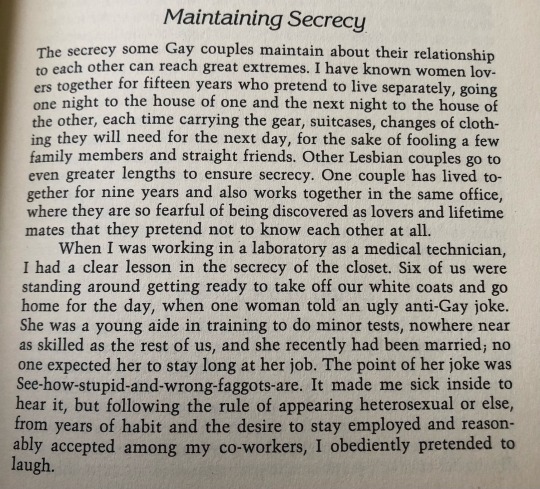

judy grahn, from another mother tongue: gay words, gay worlds, 1984
18K notes
·
View notes
Text
“For all our boyish clothes and mannerisms... we women did not pass as men or boys... our point was not to be men; our point was to be butch and get away with it... A dyke learns much of her social function from other dykes... Whether she ever has the chance to enter a Gay bar or not, she imitates dykes, not men. She may identify with traditionally dyke figures: Diana the Huntress, Beebo Brinker, Gertrude Stein, Bessie Smith, Natalie Barney, Queen Christina, Joan of Arc, Amy Lowell, Oya, St Barbara, modern athletes, and other leaders... the social message she bears and is delivering is not ‘I am a man’ but rather ‘Here is another way to be a woman.’”
-- Judy Grahn
#compulsory femininity#female masculinity#gender non conformity#gnc#lesbian culture#lesbian womanhood#many ways to be a woman#judy grahn#butch
487 notes
·
View notes
Quote
look at me as if you had never seen a woman before / I have red, red hands and much bitterness
Judy Grahn, from I’m not a girl
634 notes
·
View notes
Text

Audre Lorde, Foreword, in Movement in Black. The Collected Poetry of Pat Parker, 1961-1978, Introduction by Judy Grahn, Firebrand Books, Ithaca, NY, (1978-)1989, pp- 9-10
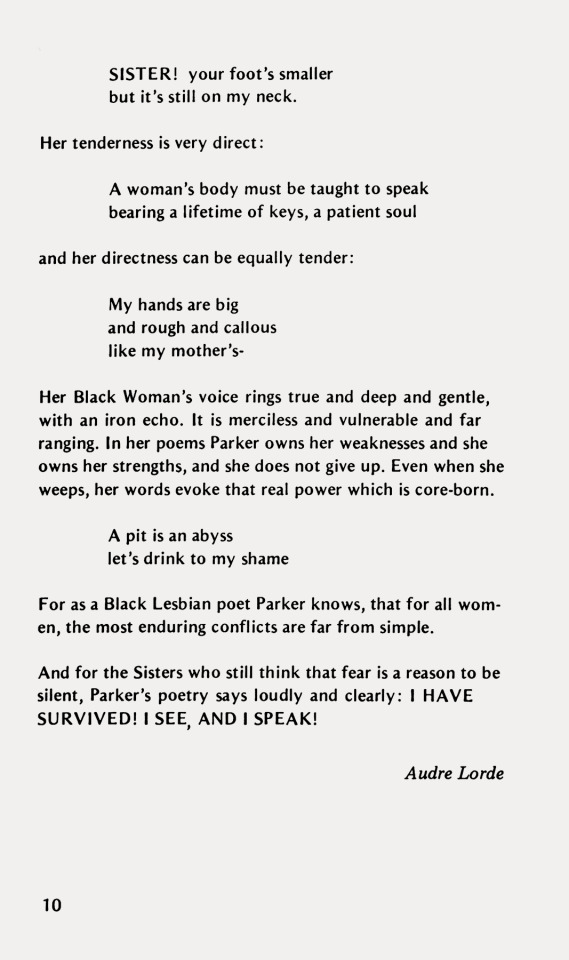
58 notes
·
View notes
Text
Anyone in New York/in the New York area? I saw the lesbian herstory archives shared that Thursday the 18th of April Judy Grahn will hold a poetry reading and conversation at the housing works bookstore. This is half the world away so obviously I can't go but I am so sad because she's been such an important author for me, but I wouldn't want anyone who could attend to not know that this is happening!
29 notes
·
View notes
Text
PARIS Y HELENA
Él la llamaba: amanecer dorado
Ella lo llamaba: silba el viento
Él la llamaba: corazón del cielo
Ella lo llamaba: mensajero
Él la llamaba: madreperla
cebadera, arrocera,
cesta de mijo, doncella del trigo,
princesa del lino, creadora de todo, inspiradora
Ella lo llamaba: cervatillo, corzo,
ciervo, coraje, hombre trueno,
siempre verde, tejedor de montañas,
guardián de bosques, mi amor va cabalgando
Él la llamaba: el árbol es
Ella lo llamaba: pájaro que baila
Él la llamaba: que resiste,
ha resistido, siempre resistirá
Ella lo llamaba: triunfador
Él la llamaba: el corazón y el útero
son similares
Ella lo llamaba: flecha en mi corazón
_ Judy Grahn. Versión de Jonio González.
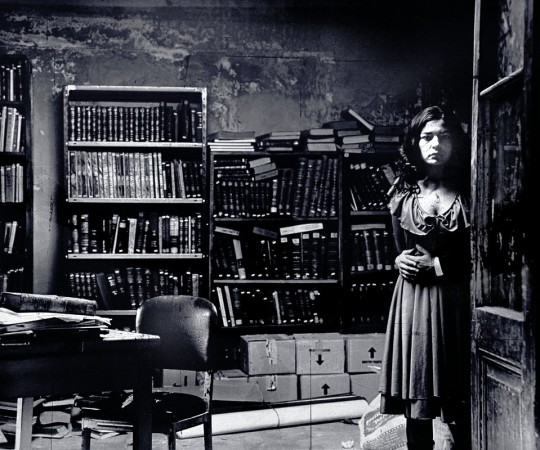
El revés de la entrega. Película orthocromática y láminas de plata. 120x100 cm.
_ Luis González Palma
20 notes
·
View notes
Text
Helen: And who did you say you were?
Pen: Penthesilea, Amazon Queen, who went once/ to war to save Queen Helen (that was you)./ "Able to make men mourn" my name signifies, / supreme Amazon speeding to the neediness of Troy,/ leader of twelve good warrior maidens,/ battle-scarred/ and with fierce reputation. We were the last/ hope that queenly Troy could keep intact/ and reachable, the greatest beauty in the world.
Helen: I remember that day./ The sky was a sheet of crystal/ and the wind was still. I ran to see your arrival/ from my windowsill./ You were like Artemis to us, you arrow-carrying bear-dykes./ I could tell Hector/ and the other men had learnt/ some of their skill from you,/ and then too, what can confuse/ a man more than a naked female/ breast with a bloody ax behind it?
Pen: You and I met before the fight./ I rode into the hall/ on the great long-legged stride/ my mother prized me for./ You turned almost at once/ to look me up and down./ My cheeks burned with pride/ though inside/ I felt more like a clown.
Helen: The Amazon were coming!/ To fight on our side!/ We women were electrified./ You looked strange to us/ but exhilarating./ I was especially electrified/ by you.
Pen: I knew it too, that moment/ at least, when our eyes met across the room./ I was your last battle ax/ and you threw it.
Judy Grahn, the Queen of Swords
#very interesting play#about the story of inanna and her descent to ereshkigal in the underworld but also connecting the figure of inanna with amongst other Helen#but set in modern times (well#mid 20th cent.)#Judy Grahn#tagamemnon#classical reception#quotes
9 notes
·
View notes
Text

Wendy Cadden and Judy Grahn photographed by Tee Corinne, 1975
105 notes
·
View notes
Text
from Women Are Tired of the Ways Men Bleed // Judy Grahn
ONE
“I know it’s irrational,” he said
“but after the Loma Prieta earthquake
I sat up in bed with my pistol
loaded and cocked.”
imagine a war
of “shoot the sea—
prevent tsunamis”
imagine if war were seen
as dysfunctional behavior
like child abuse or the many problems
in families, and say, if we wouldn’t shoot
our mothers and fathers
even when they terrify or mortally wound us
why would we drop bombs upon
the possibly not even dysfunctional strangers?
imagine if war were seen as just as
vengeful as any vengeful practices,
like, say, after the hurricane we lock up
everything that flies for having brought
the bad wind.
or we blow up the houses of those related
to those supportive of those who live with the drivers
who cause automotive accidents
imagine it’s ok
to know humanity
as we might know our dopey, dangerous, loveable
amazingly adaptable and talented family
even those whose love we continue seeking
even those we have tortured or neglected
even those who have hurt us, who oppose us
even those mysterious as water
imagine it’s ok
to know the earth
exactly as a person.
imagine Armageddon
already happened
now we’re into
reconstruction.
imagine a god named
it’s ok.
#poetry#Judy Grahn#American poetry#Queer poetry#war#pacifism#anti-war poems#poems of protest#poems of rage#feminist poetry
9 notes
·
View notes
Text
“She may dress exactly like her own brother and then pitch her voice unexpectedly high, so that everyone who meets her is thrown a little off-balance in their perceptions of accepted truths about the nature of the world.”
Another Mother Tongue: Gay Words, Gay Worlds by Judy Grahn
2 notes
·
View notes
Text

judy grahn, from another mother tongue: gay words, gay worlds, 1984
710 notes
·
View notes
Photo
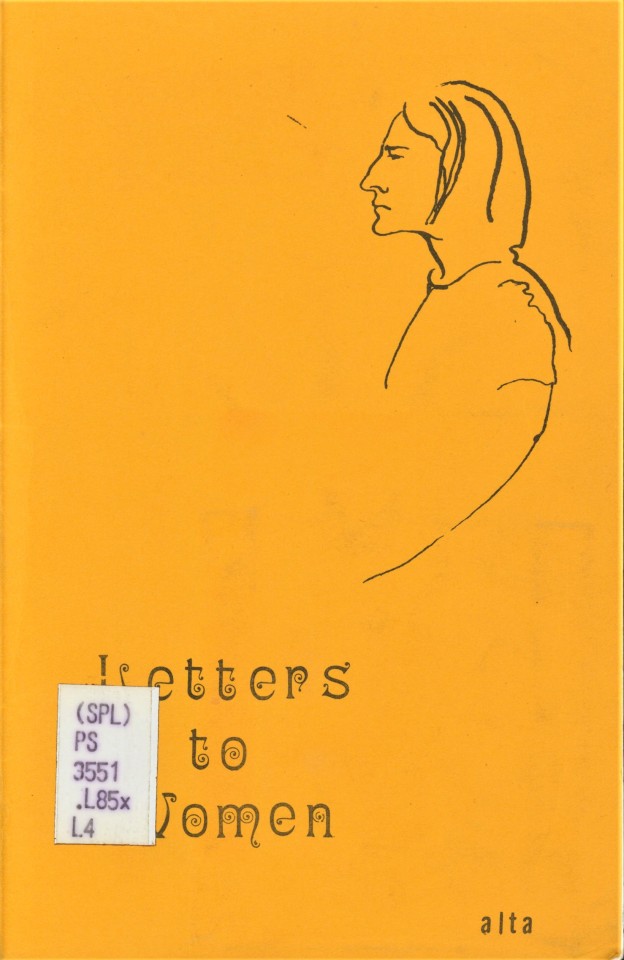
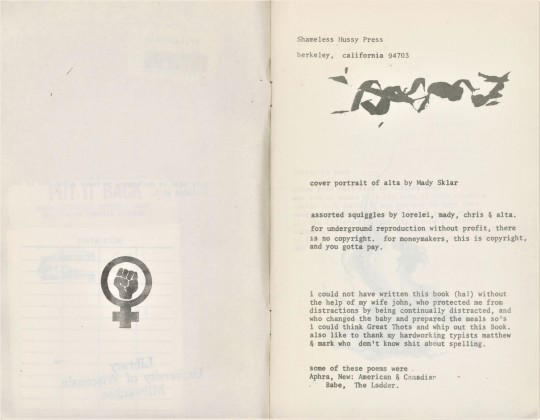
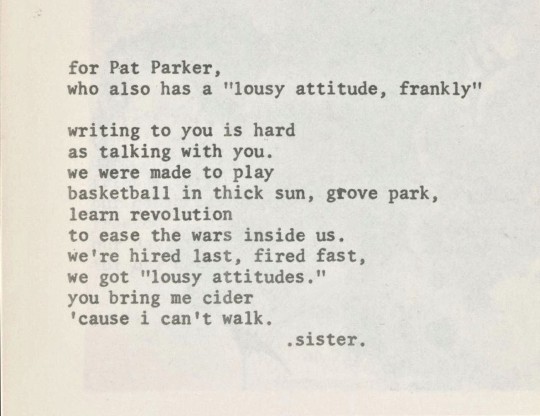
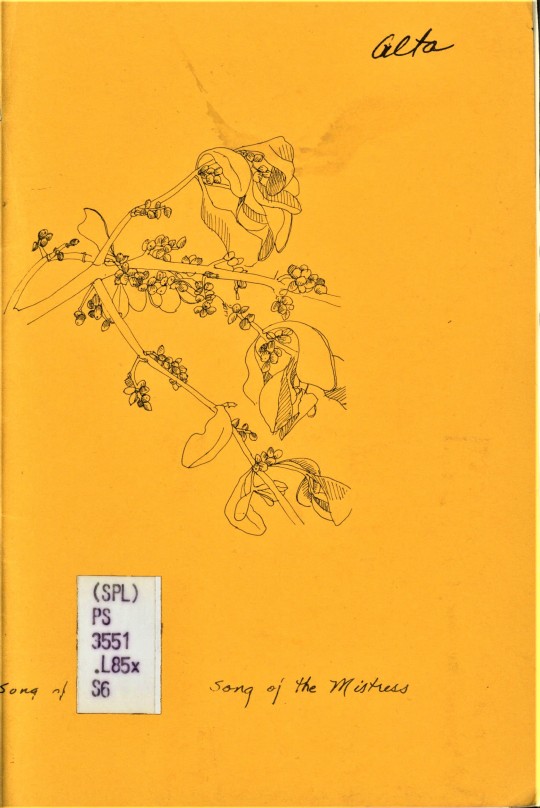
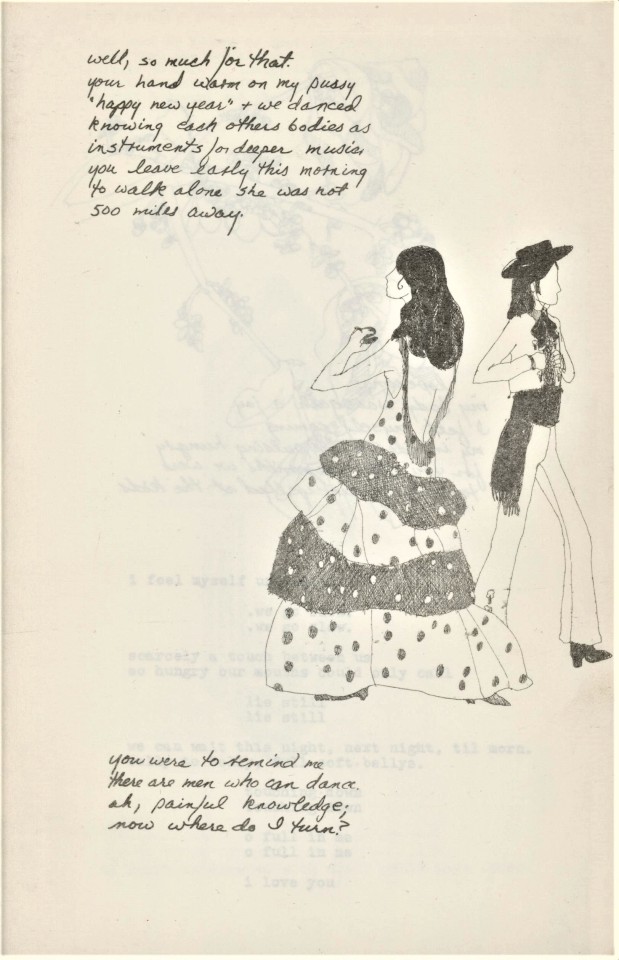
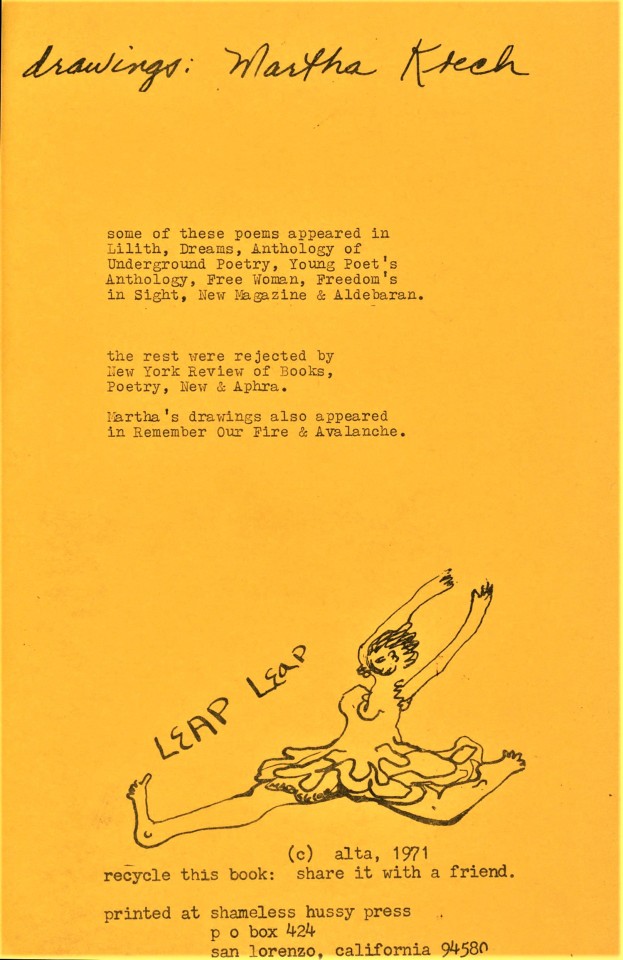
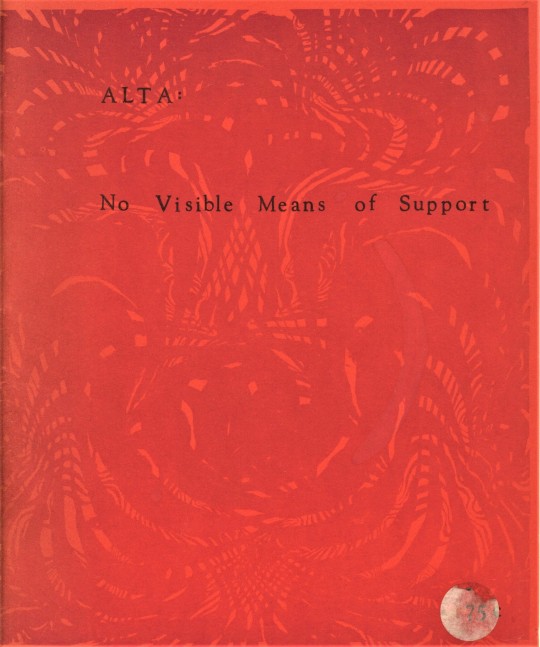
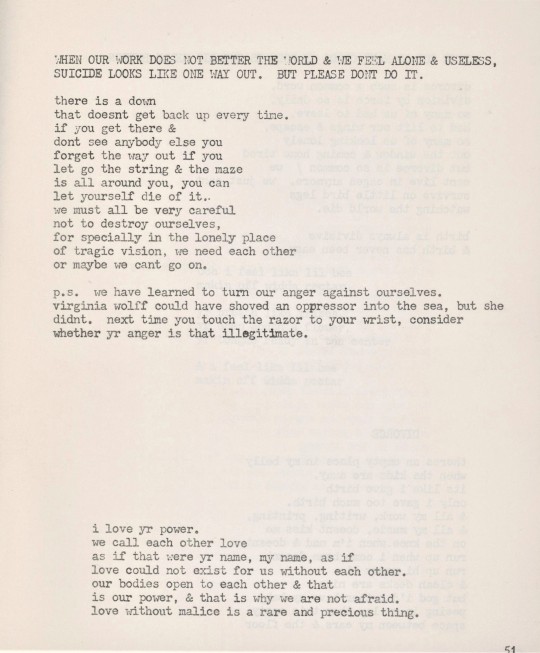
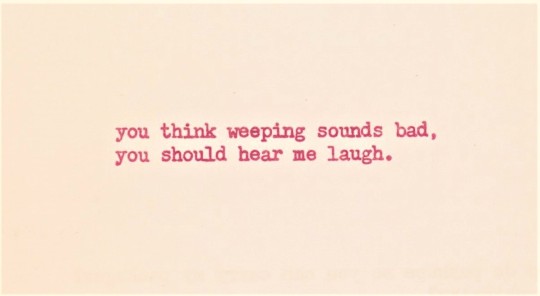
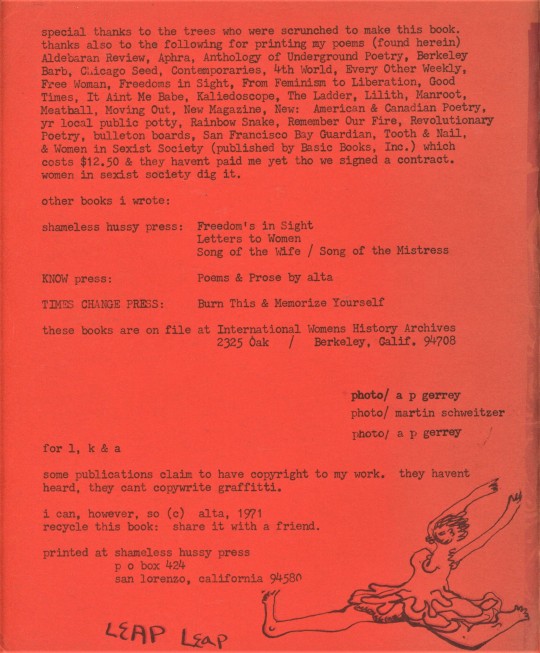
First Feminist Press!
Shameless Hussy Press
With the stress of Roe vs Wade potentially facing a repeal this summer, we want to let the women in our lives know they are not alone in their frustration. The fight women have been waging for their intellectual and bodily freedom has been a long one, so we wanted to revisit some history about the first women-owned feminist press in California, the Shameless Hussy Press! Poet and soon to be publisher Alta Gerrey founded the press in Oakland, California, in 1969, and would publish four women who later became prominent feminist writers: Pat Parker, Mitsuye Yamada, Ntozake Shange, and Susan Griffin. Alta published her own titles under her Shameless Hussy Press imprint, including three poetry collections preserved in our collection: Letters to Women, published around 1970; Song of the Wife; Song of the Mistress, published in 1971; No Visible Means of Support, published in 1971.
Alta’s sarcastic and straightforward writing style is reflected in the Shameless Hussy Press aesthetic. In her first collection, Letters to Women, she includes the iconic feminist symbol of a fist within the symbol of Venus and her copyright statement reads:
for underground reproduction without profit, there is no copyright. for moneymakers, this is copyright, and you gotta pay.
Alta emphasizes the aid of her friends and family in producing her book, and poetry aimed at letting women know that they were not alone in whatever injustices and hardships they faced, whether gender inequality and sexism, marriage and divorce, rape, mental illness, or raising children.
Alta’s second collection, Song of the Wife; Song of the Mistress, with drawings by Martha Kuech, reflects the intimacy the poet felt with her readers and how she used poetry as the outlet for emotions that could be a burden too heavy to carry at times. Letters to Women is dedicated “to every woman who is as isolated as i,” but Song of the Wife; Song of the Mistress "isn’t dedicated to anybody. eat yr hearts out.” Alta had a love for improper grammar, punctuation, and unconventional spelling. The first half of this second book reproduces a handwritten cursive script, presumably Alta’s handwriting, and the second half switches back to typewriter print. This title and Alta’s third collection, No Visible Means of Support, were both published after the Shameless Hussy Press had moved down the Bay to San Lorenzo, California, from its original location in Berkeley. Alta made the choice to move her independent press after the sabotage of a friend’s press in the same area, as well as to protect her daughter and herself from death threats she received for her work in the lesbian, feminist, and activist communities.
Shameless Hussy Press was the first to publish Ntozake’s Shange’s poetic performance work, For Colored Girls Who Have Considered Suicide When the Rainbow Is Enuf, which was later adapted into an Obie award-winning Broadway theater production. In 1976, Shameless Hussy published Camp Notes and Other Poems by Mitsuye Yamada, revolving around her experiences in the internment camps and the pain she felt at being perceived as an outsider.
The formation of the Shameless Hussy Press by Alta and the Women’s Press Collective by Judy Grahn, with aid from Pat Parker (who I posted about earlier), was quite inspirational for second wave of feminism. The four women who brought the feminist and lesbian publishing community to the foreground in California, Alta, Susie Griffin, Judy Grahn, and Pat Parker, had all met originally as neighbors over tea, but decided it was time to take action in their communities. Alta said in an interview that the group would often argue over how political their writing should be, wondering whether they should, “stick to the personal. [but] Susie kept saying, ‘the personal is political.’”
Griffin’s works were said to have launched ecofeminism in the United States as she rose to become one of the most influential American feminist writers of the 20th century. Alta’s Shameless Hussy Press gave these influential women the opportunity to be published outside the patriarchy of mainstream publishing, allowing them to completely claim their work as their own. Shameless Hussy ran from 1969-1989, despite being a one-woman-publishing house, publishing over fifty titles in its 20-y3qr existence.
–Isabelle, Special Collections Undergraduate Writing Intern
#Shameless Hussy Press#Alta Gerrey#Alta#Letters to Women#Song of Wife ; Song of Mistress#No Visible Means of Support#Judy Grahn#Feminist Press#Lesbian Poetry#Women's Press Collective#Pat Parker#Susie Griffin#Ecofeminism#Martha Kuech#Ntozake Shange#For Colored Girls Who Have Considered Suicide When the Rainbow is Enuf#Mitsuye Yamada#Camp Notes and Other Poems#Second Wave Feminism#Isabelle
29 notes
·
View notes
Text
“some die slow and some die quick” would make a dope tattoo
5 notes
·
View notes
Text

Pat Parker, My Lady Ain't No Lady, in Movement in Black. The Collected Poetry of Pat Parker, 1961-1978, Foreword by Audre Lorde, Introduction by Judy Grahn, Firebrand Books, Ithaca, NY, (1978-)1989, p. 113
#graphic design#poetry#book#audre lorde#pat parker#judy grahn#nancy k. bereano#wendy cadden#betsy bayley#marilyn humphries#irmagean#karen sjoholm#firebrand books#1970s#1980s
40 notes
·
View notes
Note
do you have any favourite lesbian (especially gnc lesbians) book/film etc characters? Or any recommendations for lesbian books?
hmmm I am not so certain I have any favourite fictional lesbians, but I do have som lesbian books to recommend!
1. another mother tongue: gay words gay worlds by judy grahn is my go to book to recommend, i really really love it (although it took two attempts for me to be able to read it). talks about gay (and especially lesbian) culture not only in the US in the period of the 60s to 80s, but also across history and the world. I found it a very grounding book to read as it talk about the position of the homosexual in society in a way which really spoke to me.
2. what comes naturally by gerd brantenberg a book about being a lesbian during the 1960s in Norway, slightly distant and ironic, but also really funny narrator. My favourite scene is when she enters the secret gay society (based on a real organisation) for the very first time.
3. wherever is your heart by anita kelley for something easy and sweet about two adult butches falling in love.
#asks#anon#judy grahn#another mother tongue: gay words gay worlds#gerd brantenberg#what comes naturally#anita kelley#wherever is your heart#quotes#links to pdfs on archive . org#lesbian#butch#butch4butch
112 notes
·
View notes
Text
“something I had not the courage to fight for, for us, our
life, our planet, our city, our meat and potatoes, our love.
These are indecent acts, lacking courage, lacking a certain
fire behind the eyes, which is the symbol, the raised fist, the
sharing of resources, the resistance that tells death he will
starve for lack of the fat of us,”
- A Mock Interrogation, Judy Grahn
0 notes